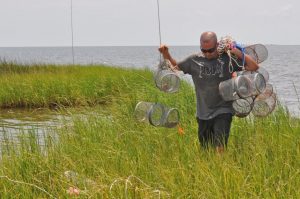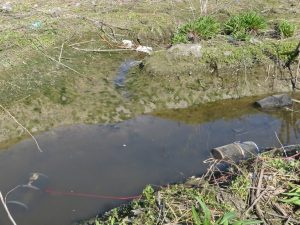Study Examines Gulf Killifish Rapid Adaptive Resistance to Contaminants
– OCTOBER 27, 2016
Scientists conducted exposure experiments on Gulf killifish populations with known adaptions to common environmental contaminates to determine how rapid adaptation affects future fish health. The researchers found that larvae from killifish that adapted to dioxin-like compounds exhibited higher resistance to oxidative stress and carbamates than did killifish larvae from areas with little-to-no known toxicant exposure. These findings suggest that adaptive toxicant resistance may involve multiple mechanistic pathways. The team published their findings in Aquatic Toxicology: Cross-resistance in Gulf Killifish (Fundulus grandis) populations resistant to dioxin-like compounds.
Previous research identified that killifish populations in the Houston Ship Channel, which has a long history of industrial pollution, rapidly adapted to resist developmental cardiac deformities caused by a complex mixture of toxicants. The expectation was that the toxin-resistant adaptation passed on to the next generation but came with physiological trade-offs such as increased sensitivity to other environmental stressors, such as hypoxia. However, no such tradeoff could be established.
Author Benjamin Dubansky noted the significance of the study’s findings, “It is astounding to see not only a fish population that appears to be unbothered by PAHs [polycyclic aromatic hydrocarbons] and other contaminants that would otherwise be lethal, but also that this trait is transmitted from one generation to the next.” He continued, “However, we did observe some interesting differences between populations, which are now driving the research in new directions to help better understand the long-term effects of toxicant exposure on fish populations.”
Author Warren Burggren emphasized the study’s contributions to understanding oil spill impacts and recovery, “In a research area where there are such frequent findings of long-term environmental disruption and damage, it’s encouraging to see that some key organisms can develop resistance to human-induced environmental degradation. This encourages us to think that some effects can be mitigated relatively quickly through the natural characteristics of the organisms.”
The study’s authors are Elias M. Oziolor, Benjamin Dubansky, Warren W. Burggren, and Cole W. Matson.
Data are publicly available through the Gulf of Mexico Research Initiative Information & Data Cooperative (GRIIDC) at doi: 10.7266/N7513W6W; doi: 10.7266/N78S4MWF.
************
This research was made possible in part by a grant from the Gulf of Mexico Research Initiative (GoMRI) to the Relationship of Effects of Cardiac Outcomes in Fish for Validation of Ecological Risk (RECOVER) consortium. Other funding sources included the Baylor University’s C. Gus Glasscock, Jr. Endowed Fund for Excellence in Environmental Sciences and the Office of the Vice Provost for Research.
The Gulf of Mexico Research Initiative (GoMRI) is a 10-year independent research program established to study the effect, and the potential associated impact, of hydrocarbon releases on the environment and public health, as well as to develop improved spill mitigation, oil detection, characterization and remediation technologies. An independent and academic 20-member Research Board makes the funding and research direction decisions to ensure the intellectual quality, effectiveness and academic independence of the GoMRI research. All research data, findings and publications will be made publicly available. The program was established through a $500 million financial commitment from BP. For more information, visit https://gulfresearchinitiative.org/.
© Copyright 2010-2017 Gulf of Mexico Research Initiative (GoMRI) – All Rights Reserved. Redistribution is encouraged with acknowledgement to the Gulf of Mexico Research Initiative (GoMRI). Please credit images and/or videos as done in each article. Questions? Contact web-content editor Nilde “Maggie” Dannreuther, Northern Gulf Institute, Mississippi State University (maggied@ngi.msstate.edu).







